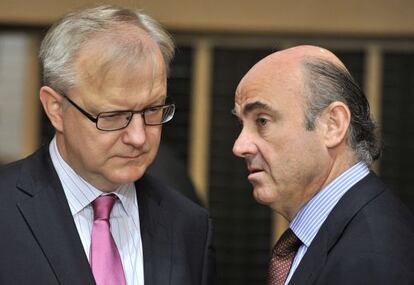Spain’s De Guindos will request bank bailout “immediately”
Economy minister says letter will be prepared on his return from Eurogroup meeting IMF’s Lagarde throws weight behind a direct recapitalization of banking sector

Economy Minister Luis de Guindos said this morning that he will send the formal request for a banking rescue package “immediately” after pressure from his European colleagues to clear up investor confidence-sapping doubts over the situation. On Thursday De Guindos had refused to be pinned down on the date of the official request, saying that it would happen in the coming days.
Today he stuck to his line that the letter was a “mere formality,” adding that the important thing was that there had been advances on the final terms of the bailout in the Eurogroup meeting between EU economy and finance ministers. “We now have an action plan, which I think is fundamental, based on the valuations performed by the independent bodies.”
On Thursday the results of two independent auditors contracted by Spain to evaluate the situation of its banking sector were made known. Oliver Wyman said the sector would need an injection of between 51 billion and 62 billion euros, while Roland Berger cited a more conservative 51.8 billion.
Earlier this month the European Union agreed to prepare a 100-billion-euro rescue package for Spain’s banks, which are laboring under the effects of the country’s real estate bust amid a recession. The initial framework was that the loan would be passed to the Spanish government’s FROB bank rescue fund, therefore counting officially as more debt for the state. After that announcement on June 10, Spain’s risk premium shot up and secondary-market terms on its benchmark 10-year sovereign bond this week soared over the seven-percent mark, considered the red alert for an unsustainable situation in terms of debt financing.
Lagarde increases the pressure on Berlin to flexibilize its austerity-at-all-costs prescription
But Spain has been holding out for a change in those probable terms of the bailout. There was pressure on EU leaders to find solutions to the euro crisis at this week’s G20 summit, while Prime Minister Mariano Rajoy has asked for a change in the rules to allow the EU rescue mechanisms to lend directly to Spain’s banks, thus decoupling the financial system’s plight from market fears for Spain’s solvency.
Italian Prime Minister Mario Monti has gone even further and proposed that the European Stability Fund could purchase Italian and Spanish bonds to help shore up their troubled economies and calm the markets. But the German government of Chancellor Angela Merkel has ruled out such a possibility.
Germany continues to insist on the bailout for Spain’s banks being linked to strong austerity measures on the part of Madrid, but statements by the IMF managing director, Christine Lagarde, on Thursday have increased the pressure on Berlin to flexibilize its austerity-at-all-costs prescription for struggling euro-zone economies.
Ahead of today’s meeting of the four biggest euro-zone nations in Rome, Lagarde invited European leaders to come up with a rescue mechanism for banks which “does not pass through governments” so that the vicious circle of sovereign debt and banking deficits can be broken. The French politician also asked for “creative” approaches to the euro crisis in which the European central Bank (ECB) should activate its “bond-buying program” as well as look to “more traditional political solutions,” such as lowering interest rates, citing another German anathema.







































